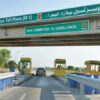KARACHI: National Database and Registration Authority (NADRA) has announced its plan to set up self-service kiosks, self-service machines in Karachi aimed at renewing expired Smart National Identity Cards (NICs). is to streamline and facilitate. Reissue of NICs.
The move aims to enable citizens to easily get their NICs without facing long queues and long waiting periods. Additionally, citizens will have the ability to perform biometric authentication, take photographs, and submit documents required to apply for smart computerized NICs without the need for an operator.
Through these automated kiosks, citizens will be able to finalize the application process for both renewal of NICs and re-issuance of lost cards.
Initially, the service will be available at NADRA’s mega centers, with plans to expand to railway stations, airports, shopping malls and educational institutions in the future.
After submitting their details, citizens can expect to receive their NICs, B-Forms and other documents at the provided address within 15 days.
After a successful trial period, these self-service machines will be installed at Mega Centers in Karachi, before being extended to more sites. NADRA plans to add a Point of Sale (POS) system in the coming phase to enable payments through credit or debit cards.
Earlier, NADRA showcased its latest biometric innovations during its maiden exhibition at Ideas 2024 in Karachi.
During the exhibition, NADRA showcased state-of-the-art biometric registration and authentication devices, which have been locally assembled through the joint development efforts of NADRA Technologies Limited and National Radio and Telecom Corporation, a press statement issued here said. I have been told.
These devices include locally assembled all-in-one handheld biometric tablets, mobile enrollment kits, self-enrollment kiosks and contactless iris cameras, the authority added.
“These devices are designed to support a modern national identity system, enhance border control mechanisms, and streamline public service delivery, with a focus on usability, security, sustainability, and affordability. “













